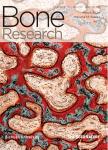Humanized bone facilitates prostate cancer metastasis and recapitulates therapeutic effects of zoledronic acid in vivo
Humanized bone facilitates prostate cancer metastasis and recapitulates therapeutic effects of zoledronic acid in vivo作者机构:Centre in Regenerative MedicineInstitute of Health and Biomedical InnovationQueensland University of TechnologyBrisbaneAustralia School of Biomedical ScienceInstitute of Health and Biomedical InnovationTranslational Research InstituteQueensland University of TechnologyBrisbaneAustralia Australian Research Council(ARC)Training Centre in Additive BiomanufacturingQueensland University of TechnologyBrisbaneAustralia UQ Diamantina InstituteTranslational Research InstituteThe University of QueenslandBrisbaneQLDAustralia
出 版 物:《Bone Research》 (骨研究(英文版))
年 卷 期:2019年第7卷第4期
页 面:388-398页
核心收录:
学科分类:0710[理学-生物学] 1002[医学-临床医学] 1001[医学-基础医学(可授医学、理学学位)] 100214[医学-肿瘤学] 10[医学]
基 金:supported by a grant from the Australian Government
主 题:metastasis PC3 drugs
摘 要:Advanced prostate cancer(PCa)is known for its high prevalence to metastasize to bone,at which point it is considered *** significant effort,there is no animal model capable of recapitulating the complexity of PCa bone *** humanized mouse model for PCa bone metastasis used in this study aims to provide a platform for the assessment of new drugs by recapitulating the human–human cell interactions relevant for disease development and *** humanized tissueengineered bone construct(hTEBC)was created within NOD-scid IL2rgnull(NSG)mice and was used for the study of experimental PC3-Luc bone *** was confirmed that PC3-Luc cells preferentially grew in the hTEBC compared with murine *** translational potential of the humanized mouse model for PCa bone metastasis was evaluated with two clinically approved osteoprotective therapies,the non-species-specific bisphosphonate zoledronic acid(ZA)or the human-specific antibody Denosumab,both targeting Receptor Activator of Nuclear Factor Kappa-Β***,but not Denosumab,significantly decreased metastases in hTEBCs,but not murine *** results highlight the importance of humanized models for the preclinical research on PCa bone metastasis and indicate the potential of the bioengineered mouse model to closely mimic the metastatic cascade of PCa cells to human ***,it will enable the development of new effective antimetastatic treatments.



